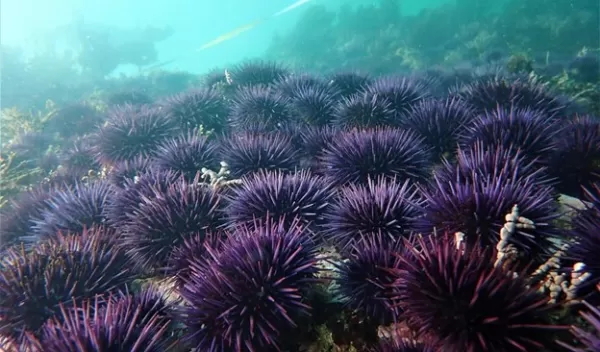
Collapse of Northern California kelp forests will be hard to reverse
Satellite imagery shows that the area covered by kelp forests off the coast of Northern California has dropped by more than 95%, with just a few small, isolated patches of the bull kelp remaining. Species-rich kelp forests have been replaced by "urchin barrens," where purple sea urchins cover a seafloor devoid of kelp and other algae.
A new study led by U.S. National Science Foundation-funded researchers at the University of California, Santa Cruz documents this dramatic shift in the coastal ecosystem and analyzes the events that caused it. The decline was not gradual but rather an abrupt collapse of the kelp forest ecosystem in the aftermath of unusual ocean warming along the U.S. West Coast starting in 2014, part of a series of events that combined to decimate the kelp forests.
Published in Communications Biology, the study shows that the kelp forests north of San Francisco were resilient to extreme warming events in the past, surviving other strong marine heatwaves and El Niño events. But the kelp forests were less resilient to the loss of a key urchin predator, the sunflower sea star. Sea urchins are voracious kelp-grazers, and sea star wasting disease left the kelp forests of Northern California without sea urchin predators.
"There were a lot of disruptions at one time that led to this collapse, and the system now persists in this altered state," said first author Meredith McPherson. "It's a naturally dynamic system that has been resilient to extreme events in the past, but the die-off of sunflower stars caused the resilience of the ecosystem to plummet. As a result, the kelp forests were not able to withstand the effects of the marine heatwave and El Niño event combined with an insurgence of sea urchins."
Bull kelp is the dominant canopy-forming kelp species north of San Francisco Bay, while giant kelp is dominant to the south. Both species thrive when strong upwelling of cold, deep water brings nutrients to the surface along the coast. Marine heatwaves and El Niño events suppress coastal upwelling, resulting in warm water and low nutrient conditions in which kelp grows poorly.
"There have been big changes before, when a strong El Niño has reduced the kelp canopy dramatically, but in the past it's always come back," said co-author Raphael Kudela. "The loss of resilience is what made this time different -- the combination of ocean warming and the loss of the sea stars allowed the urchins to take over."
Added Cynthia Suchman, a program director in NSF's Division of Ocean Sciences, "Studies such as this show how dramatic, unpredictable changes in marine ecosystems can occur with rising ocean temperatures and in particular, when other stressors are present."
